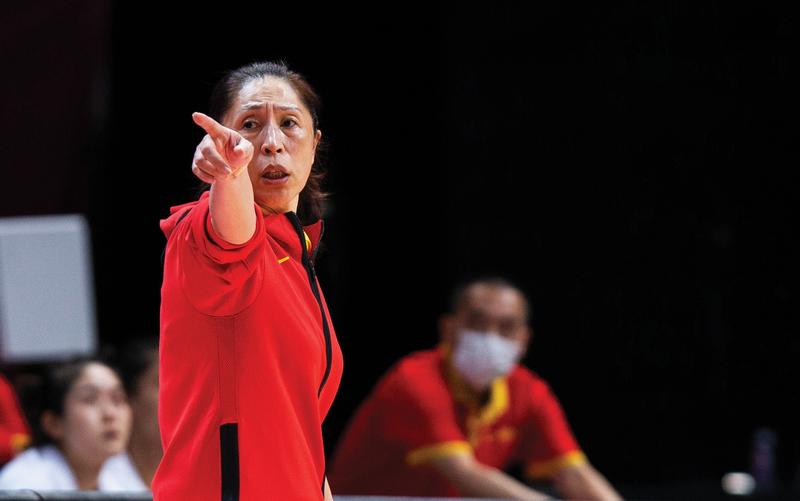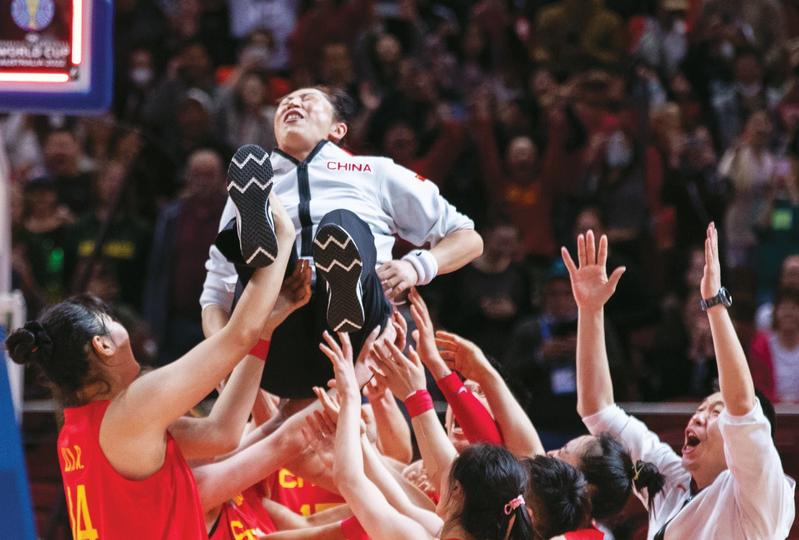Women’s basketball head coach Zheng wants to use World Cup silver as platform for Asian success this year
 Team China head coach Zheng Wei instructs her players from the sideline during the FIBA Women’s World Cup quarterfinal win against France last September. Zheng ultimately guided China to a highly commendable second-place finish at the tournament, and now hopes her players can build on that experience with more deep runs in major competitions. (PHOTO / XINHUA)
Team China head coach Zheng Wei instructs her players from the sideline during the FIBA Women’s World Cup quarterfinal win against France last September. Zheng ultimately guided China to a highly commendable second-place finish at the tournament, and now hopes her players can build on that experience with more deep runs in major competitions. (PHOTO / XINHUA)
Making the move from player to head coach in women’s basketball is no easy feat, to say nothing of making it to the final of a World Cup as both a player and head coach.
So Zheng Wei has plenty of reasons to be proud of herself.
The current head coach of China’s women’s basketball team steered her squad to second place at the FIBA Women’s World Cup last year, equaling the country’s best record in the tournament.
She was also part of the China team which reached the final of the world championships in 1994.
Zheng has overcome many setbacks during a career spanning 28 years.
During the last Olympic cycle, China was widely considered a serious medal contender at major championships, but failed to prove its prowess at the Tokyo Games in 2021.
“In Tokyo, we were outmaneuvered and eliminated by Serbia,” Zheng recalled.
A tougher pill to swallow for Zheng was last year’s FIBA Women’s Asian Cup final defeat to Japan.
“Because of these setbacks my players really wanted to move a step forward and reach a new level,” she said.
That disappointment brought back memories for Zheng of China’s defeat to Brazil in the final of the 1994 FIBA World Championship for Women.
“It was the closest the women’s national team had come to winning the world title. We defeated Australia to set up a final showdown with Brazil,” said Zheng.
“We had never lost to Brazil in previous games, so we felt like we were already the world champions. But because we were mentally unprepared and too eager for success, we didn’t play our best in that game and left with regrets,” she added.
Twenty-eight years later, Zheng made up for those regrets by guiding a young Team China to an impressive runner-up finish at the World Cup.
Ultimately losing to the United States in the final, Team China produced tenacious victories over France in the quarterfinals and Australia in the semis.
“It was the best game that France played throughout the World Cup. Their shooting percentage was very high, and it was tough,” recalled Zheng.
“But our players had prepared for that moment for years. Everyone stayed composed and didn’t want to leave with regrets. After breaking through this barrier, the players grew in confidence.”
The victory over Australia was particularly impressive considering China was without top scorer Li Meng that day.
“When the opportunity came, everyone’s determination to move forward did not change. Although Li Meng did not play, everyone else stepped up and took responsibility,” Zheng said.
“I think it was willpower that helped us. The Australians were more experienced, but by the fourth quarter, they couldn’t keep up with us.”
 Zheng is hoisted into the air after steering Team China to victory over host Australia in their FIBA Women’s World Cup semifinal in Sydney last September. (PHOTO / XINHUA)
Zheng is hoisted into the air after steering Team China to victory over host Australia in their FIBA Women’s World Cup semifinal in Sydney last September. (PHOTO / XINHUA)
From the group stage to the final, Zheng’s players kept surprising her with fantastic performances. “Maybe after breaking through that ceiling, they couldn’t be stopped. They did their best to present both technique and spirit on the court. I think there was no regret this time,” said Zheng.
Despite the huge strides made at the World Cup, Zheng believes her players’ full potential has yet to be realized.
“We only made it to the final in this tournament. It might come just by chance,” said Zheng.
“But if we genuinely are a top team like the USA, Australia, France and Spain, we need to prove ourselves in every competition.”
Zheng blames that inconsistency on a lack of experience — a problem she hopes can be tackled by building a more competitive professional league in China and scheduling more high-quality international friendlies.
She is also aiming to level up her players’ physicality on the court to better cope with the demands of the modern game, specifically its “more vaguely defined positions, fiercer defense, more intensive body contact and better individual technique”.
“I believe we are approaching our goals on the right track through training,” she added.
Having served as an assistant coach for Team China for 12 years before taking charge as head coach, Zheng is deeply impressed by the squad’s tradition of teamwork.
“Unity, cooperation, selfless dedication, and never giving up are the glorious traditions of China’s women’s basketball team,” Zheng said.
“Shao Ting and Sun Mengran have passed them on to Yang Liwei and Li Meng, and the latter are passing onto the next generation.”
Zheng said that she had good cooperation with her predecessors and learned a lot from them.
“I used to analyze opponents’ strategies for the team before, so I am very familiar with our own players and our main opponents. What I can do is bring out the players’ strength and make them more confident,” she said.
The 2022-2023 Women’s Chinese Basketball Association league season concluded on March 12. Zheng confirmed that the national team will assemble at the end of March to begin preparations for this year’s two main events — the Asian Cup and the Asian Games.
“We will play the Asian Cup in June, but some of the players who were in last year’s World Cup may not join the team because they have contracts with WNBA teams in the US, so the mission will be tough for us,” Zheng said.
Center Han Xu and veteran Yang Liwei are among those under contract with WNBA teams, and Zheng hopes their experiences in the league will help refine their games and ultimately enhance Team China’s performances.
With China targeting the Asian Cup and the Asian Games in the short term, next year’s Paris Olympics also loom large.
“We need to combine our preparations for our short- and long-term goals,” she said.
“We may recruit more young players who can compete in international events. They are eager to play for the national team. We want to observe them and help them grow.
“We hope to add one backup to every position. The national team’s roster will include 16 to 18 players this time.”
Asked about her team’s chances at Paris 2024, Zheng said: “We aim to match our World Cup performance in every major competition in the future. Hopefully we can achieve it.”


